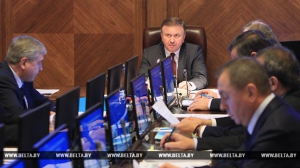Ru
|
Eng
Digital government, digital economy in focus in Belarus in 2016-2022
03.11.2015

The strategy for developing information technologies in Belarus in 2016-2022 will focus on digital government and digital economy. The relevant matters were discussed during the session of the Presidium of the Council of Ministers of Belarus on 3 November, BelTA has learned. The session focused on the draft strategy for developing information technologies in Belarus in 2016-2022.
Prime Minister of Belarus Andrei Kobyakov noted that the development pace of digital services and the penetration rate of information technologies in all spheres and all branches of the national economy were insufficiently fast. Financing is one of the reasons. However, all the government agencies should step up efforts in this area, stressed the Belarusian head of government. Now various kinds of information services are available in healthcare, employment service, transportation, nature management, retail industry, and other branches. Yet it is necessary to step up the IT penetration pace, stressed the Prime Minister.
Speaking about digital government, Andrei Kobyakov reminded that as far as digital government readiness is concerned, according to UN estimates in 2014 Belarus occupied the 55th position among 193 countries, six positions up in the last two years. “In addition to holding on to the results we have to advance further,” he said.
Belarusian Information Technologies and Communications Minister Sergei Popkov explained that the draft strategy for developing information technologies in Belarus in 2016-2022 envisages a plan of concrete actions in various areas — social sphere, real sector, transport industry, and banking industry. For instance, all the medical records have to be digitized as part of the strategy’s implementation.
Apart from that, the strategy has to contribute to more optimal interaction between the government and the nation. In particular, the share of services provided by government agencies in digital form has to reach at least 75%. On the whole, digital procedures have to be used to handle at least 95% of the workflow in government agencies.
According to Sergei Popkov, plans have been made to set up a common verification system and develop the digital key infrastructure. The advance of information technologies will also involve the deployment and development of a 4G mobile communication network.
Prime Minister of Belarus Andrei Kobyakov noted that the development pace of digital services and the penetration rate of information technologies in all spheres and all branches of the national economy were insufficiently fast. Financing is one of the reasons. However, all the government agencies should step up efforts in this area, stressed the Belarusian head of government. Now various kinds of information services are available in healthcare, employment service, transportation, nature management, retail industry, and other branches. Yet it is necessary to step up the IT penetration pace, stressed the Prime Minister.
Speaking about digital government, Andrei Kobyakov reminded that as far as digital government readiness is concerned, according to UN estimates in 2014 Belarus occupied the 55th position among 193 countries, six positions up in the last two years. “In addition to holding on to the results we have to advance further,” he said.
Belarusian Information Technologies and Communications Minister Sergei Popkov explained that the draft strategy for developing information technologies in Belarus in 2016-2022 envisages a plan of concrete actions in various areas — social sphere, real sector, transport industry, and banking industry. For instance, all the medical records have to be digitized as part of the strategy’s implementation.
Apart from that, the strategy has to contribute to more optimal interaction between the government and the nation. In particular, the share of services provided by government agencies in digital form has to reach at least 75%. On the whole, digital procedures have to be used to handle at least 95% of the workflow in government agencies.
According to Sergei Popkov, plans have been made to set up a common verification system and develop the digital key infrastructure. The advance of information technologies will also involve the deployment and development of a 4G mobile communication network.
SCIENCE. TECHNOLOGY. INNOVATIONS
13.08.2024
28.06.2024
28.06.2024
25.06.2024
05.06.2024
15.05.2024
15.05.2024
26.04.2024
26.04.2024
26.04.2024













